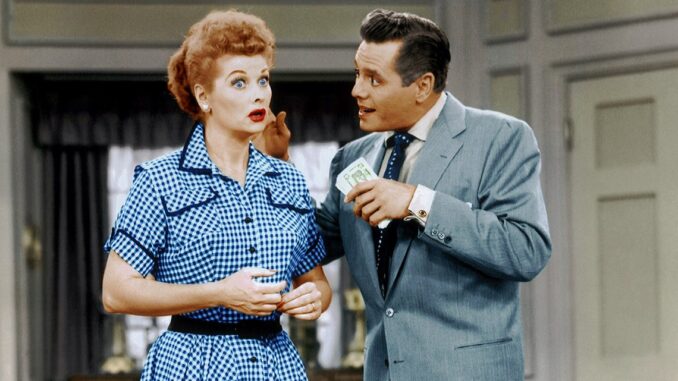
Introduction: The Magic of I Love Lucy
What makes a TV show truly timeless? For I Love Lucy, the answer lies in its groundbreaking innovations, unforgettable characters, and universal humor. Premiering in 1951, this iconic sitcom didn’t just entertain audiences; it redefined the entire television industry. Let’s dive into why I Love Lucy remains an influential powerhouse in pop culture and TV history.
A Revolutionary Format: The First of Its Kind
Pioneering the Multi-Camera Technique
Did you know I Love Lucy was the first show to use a multi-camera setup in front of a live studio audience? This approach added authenticity to the laughter and created a more immersive viewing experience. Shows today still rely on this method, proving its lasting impact.
Filming in High-Quality 35mm
While most shows of the era were broadcast live and lost forever, I Love Lucy was filmed in 35mm, preserving it for future generations. This decision set a new standard for quality and allowed the show to thrive in reruns.
Lucille Ball: The Queen of Comedy
A Trailblazer for Women in Entertainment
Lucille Ball wasn’t just the star; she was a visionary. At a time when women were rarely seen in powerful roles, she co-owned Desilu Productions, making her one of Hollywood’s first female studio heads.
Her Timeless Comic Genius
Ball’s physical comedy was unmatched. Whether she was stuffing chocolates in her mouth on an assembly line or stomping grapes in Italy, her performances were relatable and hilarious. Her ability to make audiences laugh transcended language and cultural barriers.

Desi Arnaz: The Unsung Hero
Inventing the Rerun
Desi Arnaz, Lucille Ball’s real-life husband and on-screen partner, was instrumental in creating the rerun system. His innovative thinking not only benefited the show financially but also paved the way for the syndication model that drives TV today.
Championing Diversity
As a Cuban-American actor, Arnaz broke barriers by playing Ricky Ricardo. His role showcased a mixed-race couple on screen—a bold and progressive move for the 1950s.
Groundbreaking Storylines
Tackling Real-Life Issues
I Love Lucy wasn’t afraid to address real-life situations, from marriage and pregnancy to balancing career and family. In fact, Lucille Ball’s pregnancy was written into the show—something unheard of at the time. The episode where Lucy gives birth broke viewership records, drawing over 44 million viewers.
Celebrating Everyday Life
While many shows focused on idealized families, I Love Lucy celebrated the quirks of everyday life. Whether it was Lucy’s hair-brained schemes or Ricky’s fiery temper, the show’s authenticity resonated with audiences.
Creating Iconic Moments
The Vitameatavegamin Scene
Who could forget Lucy’s hilarious attempt to sell Vitameatavegamin? This single scene embodies her incredible comedic timing and remains one of TV’s most memorable moments.
Chocolate Factory Chaos
The candy assembly line fiasco is a masterclass in physical comedy, influencing countless comedians and sitcoms.
The Show’s Cultural Impact
Setting the Standard for Sitcoms
From Friends to The Big Bang Theory, many modern sitcoms owe their DNA to I Love Lucy. Its format, character-driven humor, and relatable storylines became the template for success.
A Global Phenomenon
Even decades later, I Love Lucy continues to air worldwide, introducing new audiences to its charm and humor. It’s a testament to the show’s universal appeal.
The Business of Show Business
Desilu Productions: A Powerhouse Studio
Desilu Productions didn’t just produce I Love Lucy; it went on to create hits like Star Trek and Mission: Impossible. Lucille Ball’s business acumen helped shape television as we know it.
Merchandising and Marketing
I Love Lucy pioneered TV merchandising, with Lucy-themed dolls, comic books, and memorabilia—a practice now common in the entertainment industry.
Why the Humor Still Works Today
Timeless Themes
From marital spats to get-rich-quick schemes, the show’s themes are as relevant today as they were in the 1950s. It’s this relatability that keeps audiences hooked.
Physical Comedy: Universally Funny
Physical humor, like Lucy’s exaggerated facial expressions and slapstick antics, transcends cultural and linguistic barriers. It’s a reminder that laughter truly is a universal language.
Legacy of Love and Laughter
Inspiring Future Generations
Comedians like Carol Burnett and Tina Fey often cite Lucille Ball as a major influence. The show’s impact extends far beyond its original run, shaping the future of comedy and television.
A Blueprint for Success
By combining innovation, relatability, and top-tier comedy, I Love Lucy created a blueprint for timeless entertainment that continues to inspire creators.
Conclusion: Why Lucy Still Matters
I Love Lucy isn’t just a TV show; it’s a cultural phenomenon. With its groundbreaking innovations, unforgettable humor, and enduring legacy, it remains a shining example of television at its best. Whether you’re watching for the first time or revisiting old episodes, Lucy’s antics are sure to bring a smile to your face.
FAQs
1. What made I Love Lucy unique for its time?
The use of multi-camera setups, live studio audiences, and filming in 35mm were groundbreaking. It also tackled real-life issues like pregnancy, making it relatable and progressive.
2. How did Lucille Ball influence future generations?
Lucille Ball broke barriers as a female studio head and inspired countless comedians with her exceptional physical comedy and business savvy.
3. Why was Desi Arnaz important to the show’s success?
Arnaz introduced innovative concepts like reruns and championed diversity by portraying a mixed-race couple on screen.
4. What is I Love Lucy’s most famous episode?
The episode where Lucy gives birth, “Lucy Goes to the Hospital,” is one of the most famous and holds a viewership record to this day.
5. Why does I Love Lucy still resonate today?
Its themes are timeless, its humor universal, and its impact on television undeniable, making it a classic that transcends generations.